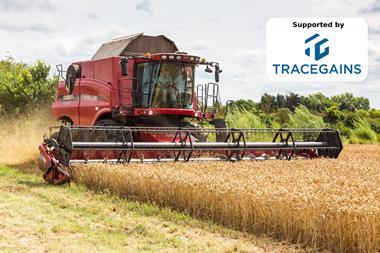Increased demand for rustic-looking breads means improver and concentrate suppliers are placing greater emphasis on helping to produce artisan-style loaves
Continued consumer demand for artisan-style loaves means improver and concentrate suppliers are adapting their ranges and launching new products to tap interest in naturally fermented sourdough and rye bread.
“Demand for an attractive, rustic-looking bread with high-quality ingredients and an authentic flavour has increased massively,” says Finbar Haughey, technical sales manager at Andrew Ingredients.
Many European ingredients suppliers are ahead of the UK in the improvers, concentrates and functional ingredients they offer to meet this need, according to Haughey. While Brits have developed a taste for artisan-style loaves relatively recently, such bread has been in demand on the Continent for far longer. But the UK is catching up fast. “In recent times the products promoted to the UK and Ireland market have changed,” says Haughey.
Andrew Ingredients has a new ready-to-use pre-ferment for preparing various types of bread using traditional methods in modern bakeries. It consists of water, flour, sugar, salt and a starter culture and, says Haughey, enhances the taste of the bread, giving good dough stability and a fine crumb.
Puratos is responding to demand for artisan-style loaves with the S500 Clean Label and S500 Sense. The latter contains natural sourdough for making bread “that is crusty and tasty and stays fresh for longer”, says marketing director Francesca Bandelli. It can also be used in a range of processes including long fermentation. “We are always developing and testing new options,” says Bandelli. “Our range includes liquid, powder, active, inactive, rye and wheat sourdough and all are clean-label.”
The trend towards the simple, natural and transparent extends to technical ingredients, and interest in clean-label improvers is growing. “Many of our suppliers have launched clean-label versions of established products,” says Haughey. “Generally, the demand for these within our customer base comes from wholesale bakeries that supply into the multiples so they have certain labelling obligations.”
Artisan bakers tend to steer clear of ‘artificial improvers’, according to Edme sales director Mike Carr. The Edme product range includes diastatic malt – a grain (typically barley) that has been sprouted, dried and milled into fine flour.
“The great thing about this natural ingredient is that it acts as a functional improver in three ways,” he says. “It increases bread volume; improves crumb texture and enhances crust browning – and only small inclusions are needed.”
Meanwhile, AB Mauri’s Aromaferm Cereal Fermentation range includes Wheat and Malt Ferment 110, suitable for sandwich bread and pizza bases, and Aromaferm Rye Ferment 200 for baguettes, ciabatta and rustic rolls. Liquid products in the range includes Aromaferm Liquid Wheat Ferment 25 for use in sweeter dough such as croissants, brioche and panettone. “The feedback from artisan bakers has been resoundingly positive, mirroring the successful sales of these blends,” says Sam Cook, AB Mauri marketing business partner.
Andrew Ingredients has a new concentrated liquid sourdough, used at 1-7% depending on the intensity of flavour required. It also offers a natural sourdough in blocked form that can be added directly to dough, giving bread products a distinctive combination of buckwheat and rye.
“Rye breads have been popular in mainland Europe for a long time, so we have always had access to rye concentrates from our main suppliers,” says Haughey. “However, we have only seen an increase in sales of such products recently, due to consumer demand in UK and Ireland.”
Tapping the health market
Ingredients firms are launching improvers and functional ingredients that can help bakers meet consumer demand for bread with added health benefits, or to tap current food trends.
Puratos marketing director Francesca Bandelli says the firm is exploring how to tap the high-protein and low-gluten consumer trends. Although a challenge for the traditional bread market from a technical ingredients perspective, the firm says it is continuing to “investigate, develop and test new ingredients”.
For businesses looking to increase the protein content of a product, using concentrates with seeds is an obvious choice, according to Mike Carr, sales director at Edme. “Concentrates can play an important role for bakers creating a range of artisan loaves,” he explains. “Our concentrates provide extra fibre, enhance taste and texture – and add visual value to baked goods. They allow bakers to offer an astonishing array of quality breads and baked goods, with protein or other nutritional claims.”
Buying, sorting and storing individual lines of seeds, flours, flakes and kibbles – and applying them consistently – can be time-consuming, he says. “Using concentrates simplifies procurement, documentation and stockholding. They provide enormous scope for artisan bakers who use them in their own recipes at their own levels of inclusion. It’s easy to adjust usage according to the benefits you want to deliver.”
Lupin bread has been flagged up as a potential health trend for 2018, made not from the English country garden flowers, but from lupini beans, a yellow legume eaten pickled as a snack in the Mediterranean. Flour made from the legume can lower blood pressure and suppress appetite, research has shown.
The vegan trend also shows no sign of slowing down, including in bakery.
“There is an emerging demand for vegan bread products, as a result of the perceived health benefits of veganism,” says Finbar Haughey, technical sales manager at Andrew Ingredients. “Many of our suppliers have redeveloped the few improvers and concentrates that may not previously have been vegan. We expect demand for such products to grow in the future.
“We have noticed increased demand for products with added health benefits,” he adds. “Our suppliers have reacted to this by producing products that boast valid health claims. For example, we stock a grain bread 50% concentrate enriched with magnesium, calcium and vitamin E. This has become a very popular product with bakeries of all sizes benefiting from the growing focus on healthy foods.”


























No comments yet